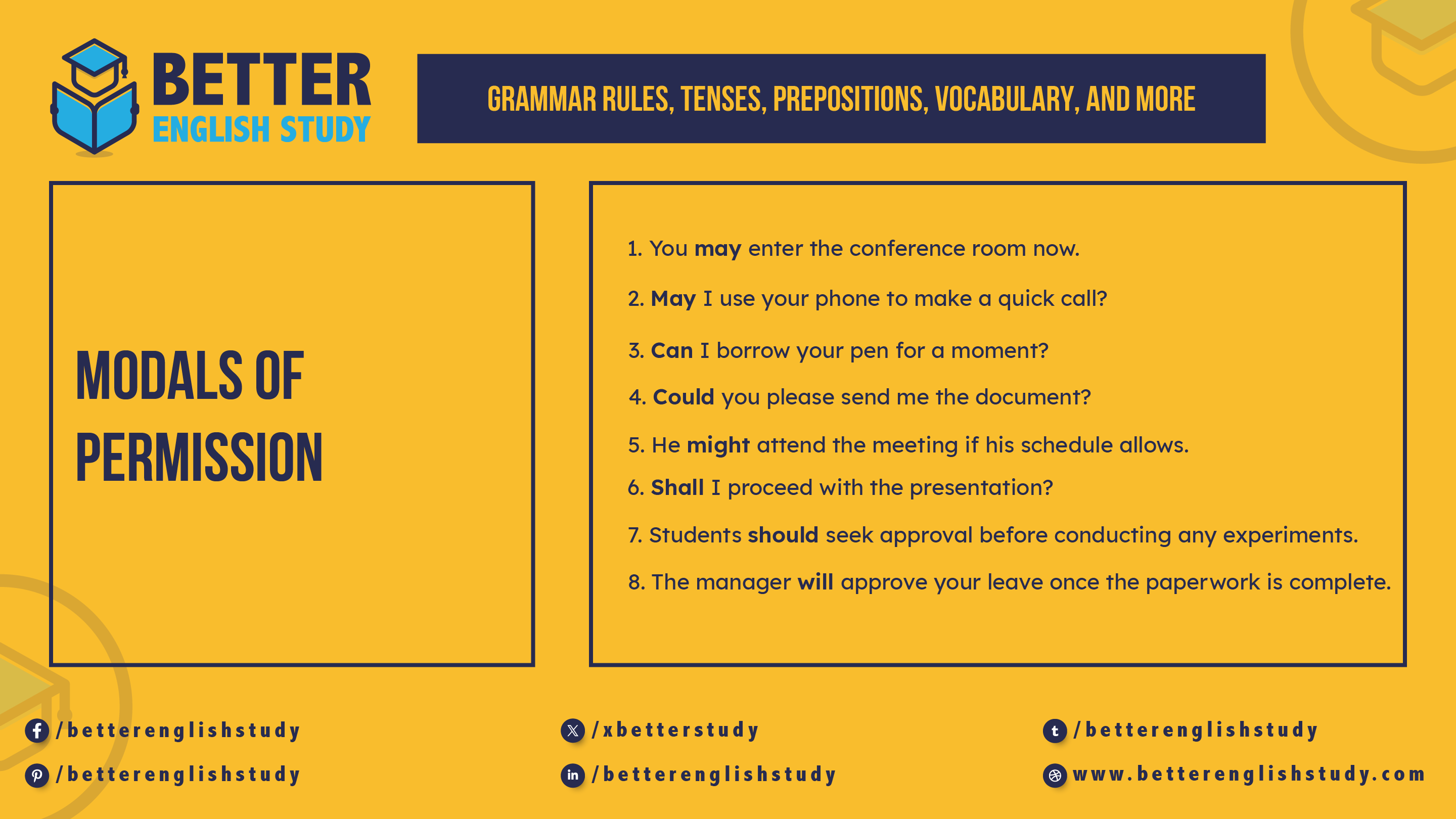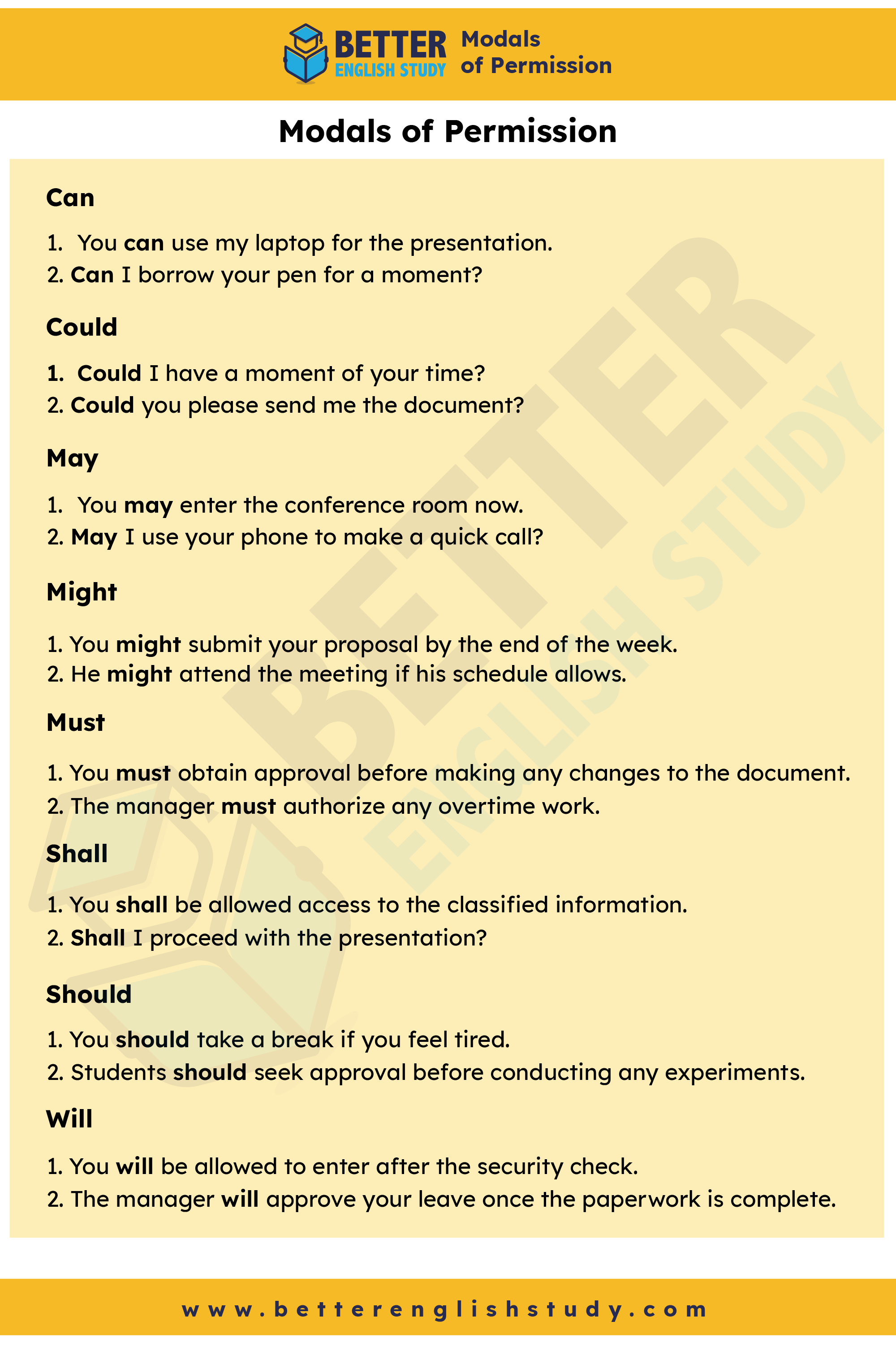
In the realm of language, communication thrives on the ability to convey permissions gracefully. Modals of permission, a subset of modal verbs, serve as linguistic keys, unlocking the doors to granting consent or allowing actions.
In this comprehensive exploration, we will navigate the nuances of modals such as ‘can,’ ‘could,’ ‘may,’ ‘might,’ ‘must,’ ‘shall,’ ‘should,’ and ‘will,’ each playing a distinct role in expressing permissions.
As we embark on this linguistic journey, we’ll unravel their meanings, applications, and shed light on the crucial fact that modals of permission are usually deployed in the present or future.
Understanding Modals of Permission
Modals of permission are indispensable tools in language, facilitating the expression of consent, authorization, or allowance. Each modal within this category brings a unique flavor to how permissions are granted or sought. Before diving into specific examples, let’s grasp the fundamental concepts that underpin these modals.
Can
Can is a versatile modal commonly used to grant or seek permission in the present or future.
Examples:
- Granting Permission: You can use my laptop for the presentation.
- Here, ‘can’ allows the person to use the laptop for the presentation.
- Seeking Permission: Can I borrow your pen for a moment?
- In this context, ‘can’ is used to seek permission to borrow a pen.
Could
Could serve as a more polite or formal alternative to ‘can’ when expressing permission.
Examples:
- Polite Permission: Could I have a moment of your time?
- ‘Could’ is used here politely to seek permission for a brief moment.
- Formal Request: Could you please send me the document?
- In this instance, ‘could’ is employed formally to request permission to send a document.
May
May is often used to convey formal or polite permission, and it can also be employed to seek permission.
Examples:
- Formal Permission: You may enter the conference room now.
- ‘May’ is used formally to grant permission to enter the conference room.
- Seeking Permission: May I use your phone to make a quick call?
- In this scenario, ‘may’ is utilized to politely seek permission to use someone’s phone.
Might
Might is less commonly used for permissions but can be employed in a formal or tentative context.
Examples:
- Tentative Permission: You might submit your proposal by the end of the week.
- ‘Might’ here suggests tentative permission to submit the proposal by the specified time.
- Formal Expression: He might attend the meeting if his schedule allows.
- In this instance, ‘might’ is used formally to express the possibility of attending the meeting.

Must
Must is often used to convey strong necessity or obligation, but it can also indicate a requirement for permission.
Examples:
- Required Permission: You must obtain approval before making any changes to the document.
- Here, ‘must’ conveys the requirement for permission before making changes.
- Granting Permission with Authority: The manager must authorize any overtime work.
- ‘Must’ is used to indicate that permission must come from the manager.
Shall
Shall is an old-fashioned modal that is sometimes used to grant or seek formal permission, particularly in British English.
Examples:
- Granting Formal Permission: You shall be allowed access to the classified information.
- ‘Shall’ is employed formally to grant access to classified information.
- Seeking Formal Permission: Shall I proceed with the presentation?
- In this context, ‘shall’ is used to seek formal permission to proceed with the presentation.
Should
Should is often used to suggest a course of action and can be employed to express a polite or advisory form of permission.
Examples:
- Polite Permission Suggestion: You should take a break if you feel tired.
- ‘Should’ is used here to suggest and give permission for a break.
- Advisory Permission: Students should seek approval before conducting any experiments.
- In this case, ‘should’ is used to advise and give permission to seek approval.
Will
Will is not commonly used for permissions, but it can be employed in a more authoritative or decisive context.
Examples:
- Decisive Permission: You will be allowed to enter after the security check.
- ‘Will’ is used decisively to grant permission after the security check.
- Assertive Permission: The manager will approve your leave once the paperwork is complete.
- In this scenario, ‘will’ is employed to assertively state that permission will be granted upon completing the paperwork.
Modals of Permission in the Present and Future
Crucially, modals of permission are typically used in the present or future. Whether granting access, seeking consent, or expressing formalities, these modals find their home in the unfolding moments of now or the anticipated events of tomorrow. This temporal aspect adds a layer of context to the nuances of permission within the dynamic fabric of language.
In the realm of communication, modals of permission serve as linguistic gatekeepers, regulating access and conveying consent with finesse. By understanding the subtleties of ‘can,’ ‘could,’ ‘may,’ ‘might,’ ‘must,’ ‘shall,’ ‘should,’ and ‘will,’ language learners gain the key to navigating permissions in diverse situations.
